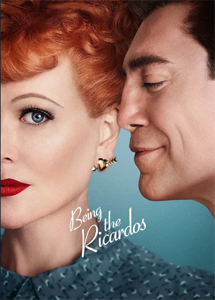Writer-director Aaron Sorkin’s “Being the Ricardos” (2021) is like an episode of “Sports Night,” “Studio 60 on the Sunset Strip” or “The Newsroom.” That’s a good thing – all three shows were popular among critics, audiences or both. It’s also an indication that Sorkin is falling back on the same old thing. But he picked a good story to tell, and that’s enough to win me over.
The Sorkin structure
A lot of people might already know about the behind-the-scenes dramas at “I Love Lucy” – after all, it drew 60 million viewers on Monday nights in the 1950s and has been well-chronicled by TV historians. Among this film’s establishing information: Stores changed their one late night of the week from Monday to Thursday to account for the lack of customers when “Lucy” aired.
I went in to “Ricardos” as someone mildly fascinated by TV history and aware that Lucille Ball (Nicole Kidman) and Desi Arnaz (Javier Bardem) had great comic timing, and that Ball was a groundbreaker as a physical comedienne. I’m the ideal audience, because “Ricardos” becomes an entertaining history lesson as it goes deeper.
“Being the Ricardos” (2021)
Director: Aaron Sorkin
Writer: Aaron Sorkin
Stars: Nicole Kidman, Javier Bardem, J.K. Simmons
Most striking, Ball is not funny except on filming day, which is Friday. (The film itself parallels this: It’s mostly dramatic, but with bursts of comedic relief as we’re reminded of Ball’s talent through re-enacted sitcom scenes, including the classic “earring in the vat of grapes.”)
She’s all business the other six days of the week, even harsh to her coworkers at times. The ageless Kidman is a 50-something we can buy in a scene where Lucy learns her film career is over after committing the actress’ cardinal sin of turning 35. (Ball would move to radio, and then the sitcom, as her talent won out.) Kidman does well with Lucy’s voice, compensating for her lack of resemblance to Ball.
Bardem is one of our finest actors; he melts into every role. Unlike Lucy, Desi is always funny in an easygoing way. But it’s hard for him to be second fiddle to his wife – not because he personally minds, but rather because Cuban culture tells him this makes him less of a man. Yet he broke his own ground simply by getting this TV role. As one film exec puts it: “He would already be a Cuban-American movie star … if there were Cuban-American movie stars.”
One wild week
“Ricardos” doesn’t shy away from the imperfections of this power couple; I almost wanted to tell Sorkin “Stop being so hard on them; they make us laugh.” Actually, Lucy and Desi are hard on each other, and we are challenged with a difficult situation: Two people love each other but can’t stay together.

A strong supporting cast complements Kidman and Bardem. J.K. Simmons, who comes from the Samuel L. Jackson school of Being In Everything (but I’m not complaining), plays actor William Frawley. Simmons gets an achingly somber moment where he notes that something dies inside a man the first time he hears a girl call him “old.”
In order to fit with Sorkin’s “week before the show” format, “Ricardos” crams years’ worth of plots and insights into one week. In reality, the various dramas – newspapers (falsely) reporting Ball is a Communist, Ball announcing her pregnancy, Vivian Vance (Nina Arianda) getting tired of her character being the butt of “unattractiveness” jokes – did not all happen in one week.
Sorkin defended this approach in an Entertainment Weekly guest column: In a historical drama, the precise timeline isn’t important; the overall truth is important. I agree; after all, a historical drama is different from a documentary.
But “Ricardos’ ” compact storytelling favors information over depth. I wanted to know more about the media’s approach to the Communist reports. Did Ball sue them for libel? And it’s weird that (in the film) no media outlet contacts Ball for a comment.
Changing the standards
NBC’s bigwigs, sponsors and writers are played by actors such as Clark Gregg, Alia Shawkat and Tony Hale, among other familiar faces. As the executive producer of “Lucy,” Hale has a standout scene where he tells Ball that the EP role means something, so he’s not going to hand out a credit to Arnaz as a trinket.
This is different today. A person can get an EP credit whether they are 100 percent or 0 percent involved in daily operations. And many lead actors get an EP credit after the show has been around for several seasons, even though their workday doesn’t change.
As someone interested in the history of standards and practices on network TV, the scene where the suits discuss how to work around Lucy’s pregnancy is amusing. We shake our heads and say, “Oh, those 1950s.” “Pregnancy” couldn’t be said on TV; “expecting” was the compromise word.
Ultra-conservative TV rules have been chipped away over the decades, with the general public generally being perfectly fine with each new “first.” That huge bloc of Christians with pitchforks never quite materializes. Now that we’re near the end of the network TV era, and also winding down the age of entertainment/information gatekeepers, TV can almost resemble reality in its details.
Sorkin himself is one of the purveyors of a certain realism through his rat-a-tat dialog featuring smart people being witty. The fact that “Ricardos” is so much in his comfort zone makes it forgettable in terms of style. But hey, it’s a good story. And with good actors and time-transporting production design, “Being the Ricardos” is as easy to like as the on-camera interplay between Ball and Arnaz.

